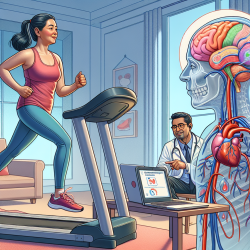Cardiorespiratory Fitness and Brain Health: Insights for Online Therapy Practitioners

The study "Cardiorespiratory fitness attenuates age-associated aggregation of white matter hyperintensities in an at-risk cohort" published in Alzheimer's Research & Therapy provides significant insights into the relationship between physical fitness and brain health. As practitioners in online therapy, understanding and integrating these findings can enhance the quality of care provided to clients, especially those at risk for Alzheimer's Disease (AD).Cardiorespiratory fitness (CRF) is a critical measure of an individual's overall physical health, often associated with better cognitive function and brain structure in older adults. The research highlights that higher CRF can attenuate the age-related accumulation of white matter hyperintensities (WMH), which are brain lesions linked to cognitive decline and AD.
Key Findings
- Higher CRF levels are associated with a reduction in the age-related increase of WMH.
- Individuals with high CRF show less WMH accumulation compared to those with low CRF.
- The study used the Oxygen Uptake Efficiency Slope (OUES) as a measure of CRF, which is highly correlated with VO2 peak but more attainable for older adults.
Implications for Online Therapy Practitioners
- Encouraging Physical Activity: Incorporate discussions about the benefits of physical activity into therapy sessions. Highlight how improving CRF can contribute to healthier brain aging.
- Personalized Exercise Plans: Work with clients to develop personalized exercise plans that are safe and effective, taking into account their physical capabilities and health conditions.
- Monitoring Progress: Use tools and techniques to monitor clients' progress in improving their CRF, providing motivation and support along the way.
- Education and Awareness: Educate clients about the relationship between physical fitness and brain health, emphasizing the long-term benefits of maintaining a high CRF.
Encouraging Further Research
As practitioners, staying updated with the latest research is crucial. Encouraging clients to engage in regular physical activity not only improves their physical health but also contributes to better brain health. Further research in this area can help refine therapeutic approaches and provide more personalized care.To read the original research paper, please follow this link:
Cardiorespiratory fitness attenuates age-associated aggregation of white matter hyperintensities in an at-risk cohort.
Citation: Vesperman, C. J., Pozorski, V., Dougherty, R. J., Law, L. L., Boots, E., Oh, J. M., Gallagher, C. L., Carlsson, C. M., Rowley, H. A., Ma, Y., Bendlin, B. B., Asthana, S., Sager, M. A., Hermann, B. P., Johnson, S. C., Cook, D. B., & Okonkwo, O. C. (2018). Cardiorespiratory fitness attenuates age-associated aggregation of white matter hyperintensities in an at-risk cohort. Alzheimer's Research & Therapy, 10(1), 97. https://doi.org/10.1186/s13195-018-0429-0










